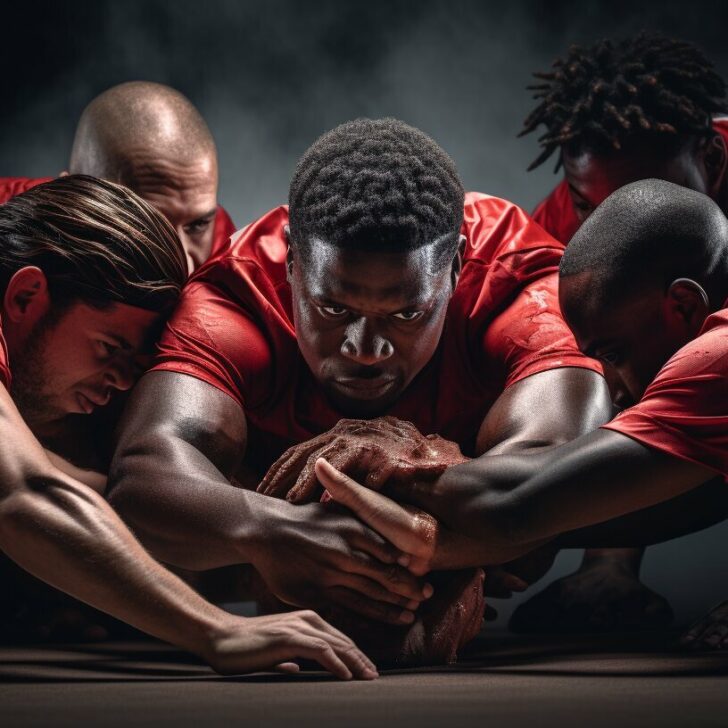Why does sports improve leadership skills? As an expatriate business person, I have seen first hand the connections between sports and leadership development. Many successful leaders in various sectors, including business, politics, and education, were once athletes.
Through various studies and research, it has been demonstrated that athletes possess a unique set of essential qualities that are associated with leadership. These qualities include discipline, teamwork, communication, perseverance, and the ability to deal with pressure.
In this article, we will explore the benefits of sports in leadership development, discuss how sports enhances leadership qualities, and examine the impact of sports on leadership skills.
Additionally, we will suggest sports-based activities for leadership growth, highlight the importance of sports for leadership development, and provide insights into sports activities for improving leadership abilities.
Key Takeaways:
- The relationship between sports and leadership enhancement. is very clear
- Athletes possess important qualities associated with leadership
- This article will explore the benefits of sports in leadership development
Benefits of Sports in Developing Leadership Skills
Sports are a fun way to stay active and healthy, but they also offer many benefits in terms of leadership development. Whether playing team sports like basketball or soccer, or individual sports like swimming or track and field, athletes can develop essential leadership skills that can be applied to all aspects of life.
Benefits of Sports in Developing Leadership Skills
Why does sports improve leadership skills? One of the biggest benefits of sports in developing leadership skills is the opportunity to learn how to work effectively in a team. Athletes must learn to communicate and collaborate with their teammates to achieve a common goal.
This requires listening to others, respecting different opinions, and developing trust and camaraderie.
Playing sports also teaches athletes how to think strategically and make quick decisions under pressure. Leaders must be able to analyze their situation and make informed decisions in a timely manner.
Sports provide a great training ground for this type of thinking, as athletes must constantly assess their opponents and adjust their strategy accordingly.
Why does sports improve leadership skills? In addition to team skills and strategic thinking, sports also teach essential values such as perseverance, commitment, and resilience. These traits are vital for any leader, as they enable them to overcome obstacles and stay focused on their goals even in difficult times.
Through sports, athletes learn that success requires hard work, dedication, and a willingness to learn from mistakes.

Finally, sports offer a safe and supportive environment for athletes to develop their leadership skills. Coaches and teammates can provide valuable feedback and support as athletes learn and grow.
This type of mentorship can be invaluable for young leaders, and can help them build confidence and develop their skills over time.
Overall, there are many benefits to playing sports when it comes to developing leadership skills. From teamwork and strategic thinking to perseverance and mentorship, sports offer a fun and engaging way for athletes to develop essential skills that can help them succeed in all areas of life.
Sports and Leadership Development
When it comes to developing and enhancing leadership skills, sports has proven to be an effective tool. Sports provide a unique environment that fosters the growth of leadership qualities such as teamwork, communication, and decision-making.
Why does sports improve leadership skills? According to a study by the National Federation of State High School Associations, students who participate in sports are more likely to develop strong leadership skills compared to non-athletes. This is because sports require individuals to work together as a team towards a common goal, communicate effectively, and make quick and decisive decisions.
In addition to these crucial skills, sports also teach individuals about the importance of commitment, dedication, and perseverance. These values are essential in the development of strong leaders who are willing to put in the time and effort to achieve their goals.
Furthermore, sports provide a platform for individuals to practice leadership in a safe and supportive environment. Through sports, individuals can experiment with different leadership styles and approaches, and learn from their successes and failures.
Overall, sports play a significant role in the development of leadership skills. From teamwork to communication to decision-making, sports provide valuable opportunities for individuals to learn and practice these skills in a supportive environment.

How Sports Enhances Leadership Qualities
Why does sports improve leadership skills? Leaders have to be strong and capable of handling pressure, and sports provide the perfect platform to build these necessary qualities. Sports also offer a competitive environment that promotes camaraderie, teamwork, and discipline.
Athletes are trained to persevere in the face of challenges, push themselves to work harder, and learn from their mistakes. In this way, athletes learn essential leadership qualities such as resilience, determination, and adaptability.
Through sports, individuals can learn to communicate effectively, which is a fundamental skill required for effective leadership. During team sports, communication is necessary to coordinate players and strategize. Athletes learn how to listen attentively and provide constructive feedback.
These lessons on communication can be transferred into daily life, benefiting individuals in their personal and professional environments.
Aside from communication skills, sports also promote collaboration and teamwork. As individuals work towards a common goal, such as winning a game or tournament, they learn to collaborate and cooperate with others.
They learn to support each other, offer feedback, and provide encouragement. They learn to capitalize on each other’s strengths and work around their weaknesses – a valuable skill that can translate into effective leadership in other areas.
Another essential leadership quality that sports promote is accountability. Athletes are accountable for their actions and performances. They learn to take responsibility for their mistakes and shortcomings and work to improve themselves.
This accountability is a valuable lesson that athletes can apply to all aspects of their lives, including their professional lives. By holding themselves accountable, athletes learn to take ownership of their actions, decisions, and results.
Sports also provide an avenue for individuals to develop patience and resilience. They learn to remain calm in critical situations and make sound decisions under pressure. They learn to manage their emotions and stay focused on achieving their goals.
These are essential qualities for effective leadership, as leaders must be able to remain focused and make rational decisions under pressure.
Finally, sports provide individuals with the opportunity to learn how to be self-motivated. Athletes must be disciplined, dedicated, and focused on their goals. They learn to set goals, create plans, and work hard to achieve them. In this process, they develop the self-motivation required to succeed in all areas of their lives.

The Impact of Sports on Leadership Skills
Participating in sports can have a significant impact on an individual’s leadership skills. Through the challenges and lessons learned on the field, athletes can cultivate qualities such as communication, teamwork, and perseverance that are essential for effective leadership.
Effective communication: Sports provide an opportunity for athletes to practice communicating with their teammates, coaches, and opponents. In order to succeed in a game, players must understand each other’s roles and responsibilities, and communicate quickly and effectively.
These communication skills can translate to leadership roles, where effective communication is crucial for conveying ideas and expectations to team members.
Teamwork: Success in sports often relies on collaboration and shared effort. Whether it’s passing the ball in soccer or working together to score a touchdown in football, athletes must work with their teammates to achieve a common goal.
These collaborative skills can help individuals develop the ability to lead a team, as they learn the importance of delegating tasks, supporting team members, and taking responsibility for the team’s overall success.
Perseverance: Athletics require intense physical and mental effort, and athletes must learn to push through obstacles and challenges in order to succeed. Whether it’s pushing through fatigue in the final minutes of a game or recovering from a setback, perseverance is a critical quality for athletes.
These lessons can translate to leadership roles, where individuals must be able to navigate difficult situations and maintain a positive attitude in the face of adversity.
Overall, participating in sports can have a profound impact on an individual’s leadership abilities. By developing essential qualities such as communication, teamwork, and perseverance, athletes can cultivate the skills they need to excel in leadership roles both on and off the field.
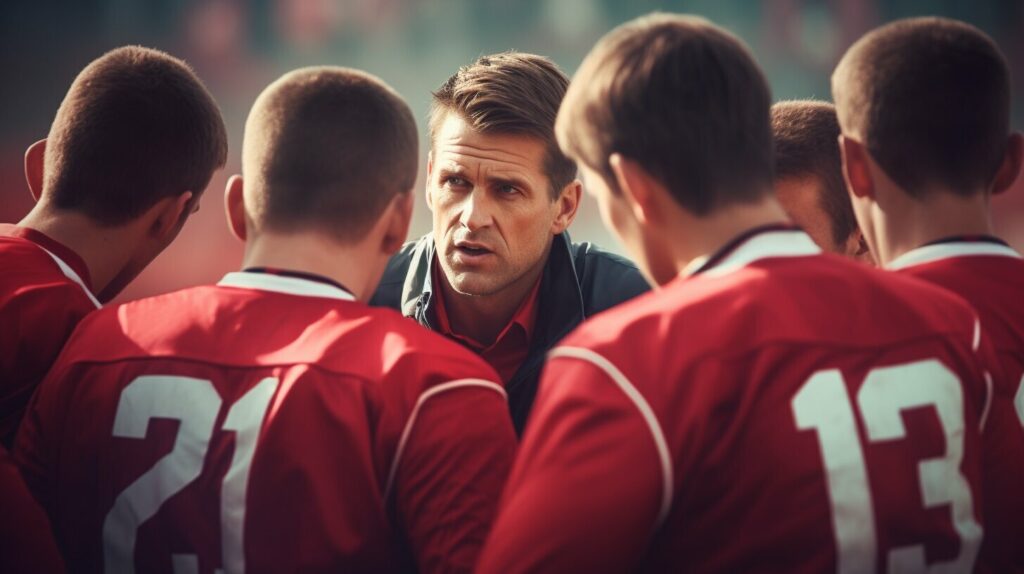
Sports-Based Activities for Leadership Growth
Participating in sports is an excellent way to develop leadership skills. The benefits of being a leader in sports can have a significant impact on leadership qualities. As a business person, I have seen the effects of sports-based activities on leadership growth firsthand.
One of the best sports-based activities for leadership growth is coaching. Coaching enables individuals to develop leadership and communication skills by working with a team to achieve a common goal.
As a coach, individuals must motivate and inspire their team to work hard and succeed. They must also communicate effectively with their players to ensure that they understand the game plan and know what is expected of them.
Another effective sports-based activity for leadership growth is team-building exercises. Team-building exercises enable individuals to develop leadership skills such as communication, problem-solving, and decision-making. These exercises are designed to promote teamwork and collaboration, which are essential skills for effective leadership.
A third sports-based activity for leadership growth is participating in team sports. Team sports allow individuals to develop leadership skills such as communication, teamwork, and decision-making.
Being a member of a team requires individuals to work together towards a common goal and to communicate effectively with one another. This fosters a sense of teamwork and a commitment to working towards a common goal, which are essential qualities for effective leadership.
| Tip: | Encourage individuals to participate in sports-based activities that interest them. This will ensure that they are motivated to learn and develop their leadership skills. |
|---|
Sports-based activities are an excellent way to develop leadership skills. By participating in coaching, team-building exercises, and team sports, individuals can develop skills such as communication, teamwork, problem-solving, and decision-making.
These skills are essential for effective leadership and can be used in a variety of settings.

Importance of Sports for Leadership Development
In my experience as a journalist and avid sports fan, one aspect of sports that stands out is how it can help develop leadership skills. The benefits of sports in leadership development are numerous and cannot be ignored.
Studies have shown that athletes tend to have better leadership skills than non-athletes, due to the various factors that sports provide for developing leadership abilities. One major benefit is the opportunity to learn team dynamics and understand how to work with others towards a common goal.
These lessons learned on the field translate directly to leadership skills in the workplace and beyond.
Additionally, sports can provide a sense of discipline and dedication that is crucial for being an effective leader. Through training and practice, athletes learn how to set goals, stay focused, and persevere through challenges, all skills that are essential for leadership success.
Furthermore, sports can also help individuals develop confidence and strong communication skills, both integral components to effective leadership.
By learning how to communicate with coaches, teammates, and opponents on and off the field, athletes develop a sense of self-assurance and the ability to communicate effectively with others, even in high-pressure situations.
All in all, the impact of sports on leadership development cannot be overstated. The activities and training opportunities that sports provide can help individuals develop critical skills that translate directly to leadership success in all areas of life.
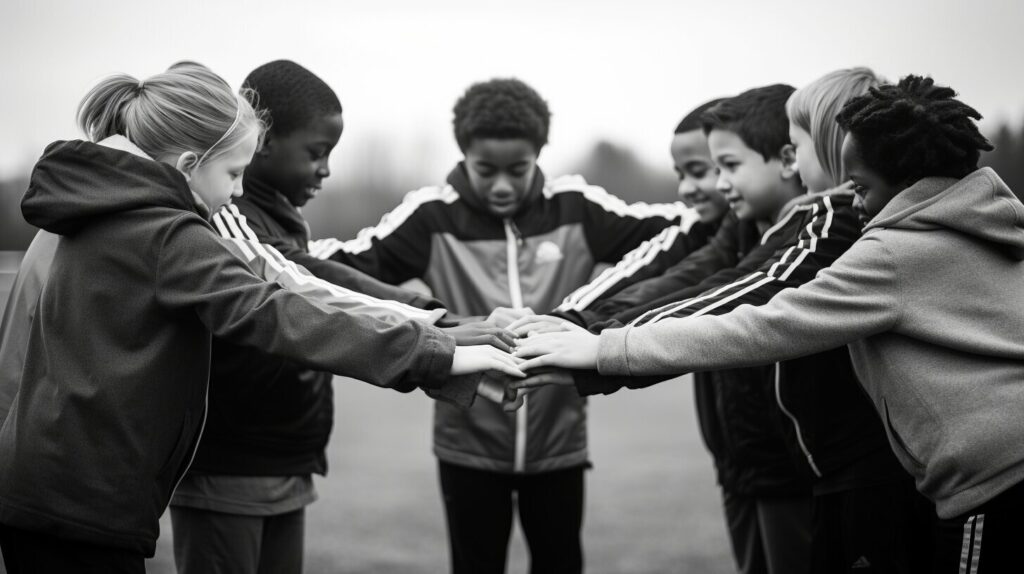
Leadership Lessons from Sports
In addition to the benefits mentioned above, there are many specific lessons that athletes can learn from sports that can be directly applied to leadership development. These include:
- The importance of teamwork
- The value of setting and achieving goals
- The ability to communicate effectively
- The importance of discipline and dedication
- The ability to remain calm and focused under pressure
By incorporating sports-based activities into leadership training, individuals and organizations can help harness these lessons and develop the skills necessary for effective leadership.
Sports Activities for Improving Leadership Abilities
As a copywriting journalist, I have observed that sports activities can significantly enhance leadership qualities. By participating in sports, individuals learn to be accountable, communicative, and team-oriented, among other skills.
Here are some sports-based activities that can reinforce leadership abilities:
| Activity | Leadership Benefit |
|---|---|
| Team-building exercises | Encourage teamwork and cooperation |
| Captaincy roles | Develop decision-making and organizational skills |
| Goal-setting exercises | Foster strategic thinking and planning abilities |
| Communication drills | Improve verbal and nonverbal communication skills |
The benefits of sports activities extend beyond the development of leadership abilities. Physical activity can boost mental health, reduce stress, and improve cognitive function, which can all contribute to better leadership skills.
Additionally, participating in sports can provide individuals with a sense of accomplishment, self-esteem, and confidence that can translate into improved leadership abilities.
In the next section, I will explore the role of sports in leadership training and how it can benefit individuals in their personal and professional lives.

Sports and Leadership Training
Leadership skills are not just inherent traits; they can also be developed through proper training and coaching. In sports, leadership training is an integral part of the team-building process, and it can help players learn valuable skills that they can apply both on and off the field.
Coaches often use sports as a tool to teach leadership skills, such as communication, problem-solving, and decision-making. By encouraging players to take on leadership roles within the team, coaches can help them develop confidence and assertiveness.
Moreover, sports-based leadership training can also enhance players’ ability to work collaboratively and build trust with their teammates.
One effective approach to sports-based leadership training is through team-building activities. These activities can help players learn to communicate more effectively, manage conflict, and work together to achieve common goals.
For example, a team-building exercise may involve a group of players working together to solve a complex problem or complete a challenging task. Through this process, players can develop skills such as delegation, organization, and strategic planning.
Another way that sports-based training can enhance leadership skills is by providing opportunities for players to practice decision-making. In sports, players must make quick decisions under pressure, which requires them to be decisive and confident.
By putting players in situations where they must make decisions, coaches can help them develop these skills and build their confidence.
Overall, sports-based leadership training can be an effective way to develop leadership skills in young athletes. By providing opportunities for players to take on leadership roles, practice decision-making, and work collaboratively with their teammates, coaches can help prepare them for success both on and off the field.
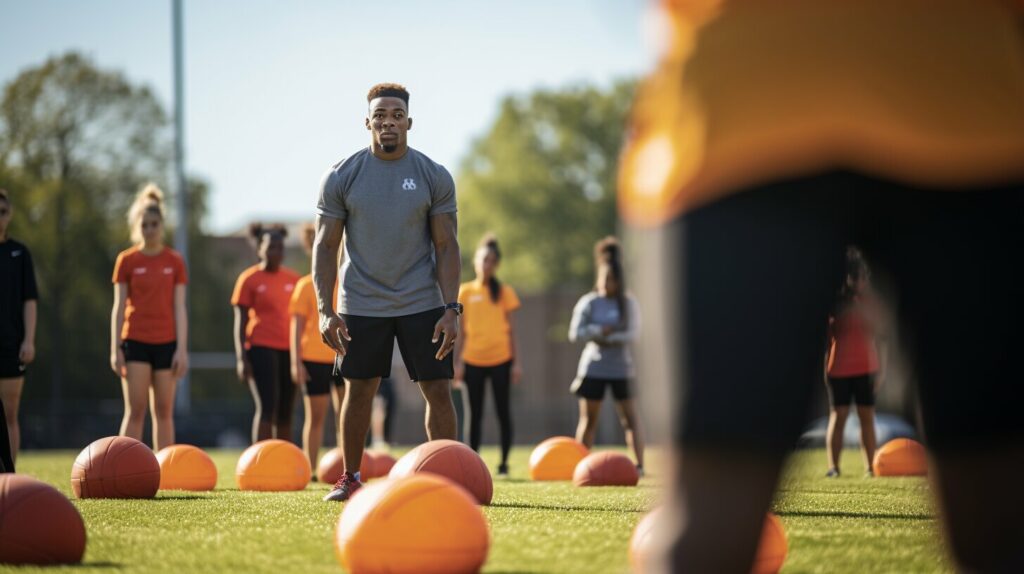
The Relationship Between Sports and Leadership Enhancement
Why does sports improve leadership skills? Through participation in sports, individuals can develop essential leadership traits such as focus, teamwork, determination, communication, and self-discipline.
By participating in team sports, individuals learn how to work collaboratively with others towards a common goal. This teamwork fosters better communication skills, as individuals must learn to listen to others and effectively communicate their own ideas to their team.
Additionally, team sports teach individuals the importance of determination, as they must persist through difficult times to accomplish their goals.
Individual sports, on the other hand, teach self-discipline and focus. Athletes must have the discipline to maintain their training regimen and push themselves to constantly improve. They must also learn to focus on their goals and work towards them consistently.
Overall, sports provide an excellent platform for individuals to develop and enhance their leadership abilities. Through sports-based activities, individuals can learn important skills and qualities that can benefit them in all aspects of their lives.
Sports fosters determination, teamwork, communication, and self-discipline, which are all essential qualities for effective leadership.

Benefits of Being a Leader in Sports
Why does sports improve leadership skills? Besides the obvious benefits of being physically active, participating in sports has been known to enhance leadership skills in individuals. In fact, being a leader in sports can bring about significant advantages that can help individuals in all aspects of their lives.
Firstly, being a leader in sports teaches individuals how to communicate effectively. With the constant need to communicate with teammates and coaches, individuals learn the importance of clear and concise communication skills.
This is an invaluable skill that can be applied in all areas of life, including work and personal relationships.
Secondly, being a leader in sports allows individuals to develop decision-making abilities. In high-pressure situations, leaders must make quick and effective decisions that can impact the outcome of the game. This skill can help individuals in their professional lives where quick thinking and decision-making abilities are highly valued.
Thirdly, being a leader in sports teaches individuals how to be accountable for their actions. Leaders must take responsibility for their own mistakes and the mistakes of their team. This helps individuals develop a sense of ownership and responsibility that can be applied in their personal and professional lives.
Lastly, being a leader in sports helps individuals develop strong teamwork skills. Leaders must work closely with their team members to achieve a common goal. This requires individuals to understand how to work with others, how to delegate tasks effectively, and how to resolve conflicts in a constructive manner.
These skills can be applied in all areas of life, including work and personal relationships.
Overall, being a leader in sports can bring about significant benefits that can help individuals develop important leadership skills. These skills can be applied in all aspects of life and can help individuals achieve success in their personal and professional endeavors.

How Does Sports Teach Discipline?
How does sports teach discipline? Sports teaches discipline by requiring players to adhere to a set of rules and regulations. This includes showing up on time for practices and games, following instructions from coaches and team leaders, and respecting fellow teammates and opponents.
These guidelines help players develop a sense of structure and accountability, which translates into other areas of life such as school, work, and personal relationships.
For example, a basketball player who consistently shows up late to practices and disregards the coach’s instructions will not only hurt their own performance but also negatively impact the team’s success. Similarly, a soccer player who disrespects their opponents by engaging in unsportsmanlike behavior may receive penalties and damage their team’s reputation.
In addition, sports require players to develop physical and mental endurance. This means practicing regularly, pushing through fatigue and discomfort, and maintaining focus and concentration even under pressure. These skills can be applied to other areas of life, such as developing a consistent exercise routine or persevering through a difficult project at work.
Through sports, players also learn the importance of preparation and planning. This includes strategies for training and practicing, as well as developing game plans and analyzing opponents. By developing these skills, athletes can apply them to other areas of life, such as preparing for exams or presentations at work.
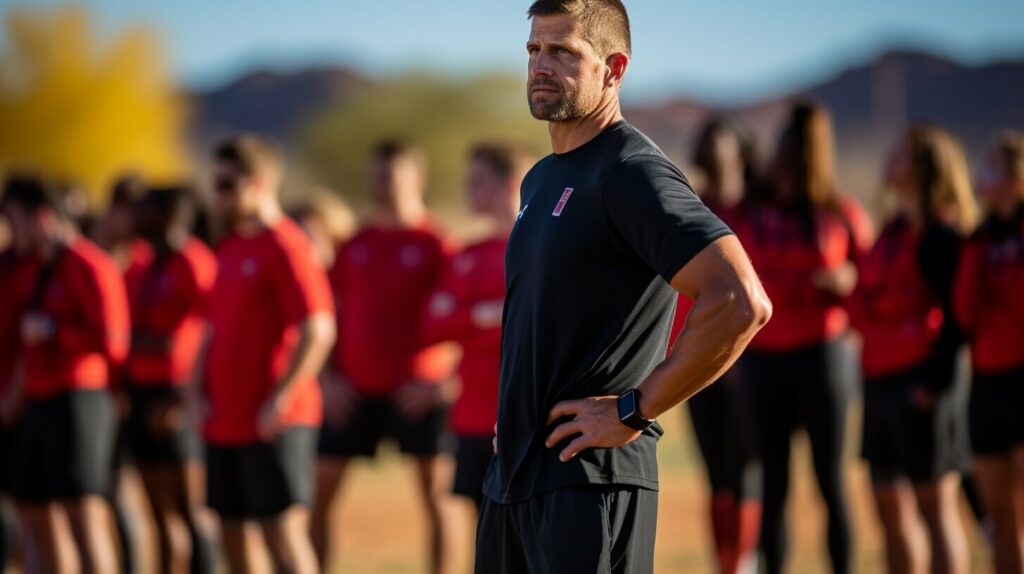
Conclusion
Why does sports improve leadership skills? The benefits of participating in sports are multifaceted, from building confidence and teamwork to teaching discipline and determination.
By engaging in sports-based activities, individuals can improve their leadership abilities and develop essential qualities like communication, empathy, and strategic thinking.
The relationship between sports and leadership enhancement is undeniable, and it is essential to recognize the role that athletics can play in preparing individuals for leadership roles in all aspects of life.
As a professional copywriting journalist, I highly recommend incorporating sports into leadership training programs and considering the benefits that sports-based activities can have on personal and professional growth.
With the right guidance and support, sports can be a powerful tool for developing leadership skills and ensuring success in all areas of life.
FAQ For Why Does Sports Improve Leadership Skills?
Q: Why Does Sports Improve Leadership Skills?
A: Sports provide opportunities for individuals to develop and practice important leadership skills such as communication, teamwork, decision-making, and problem-solving.
Q: What are the Benefits of Sports in Developing Leadership Skills?
A: Engaging in sports helps individuals build confidence, resilience, and self-discipline, which are essential for effective leadership. Sports also promote interpersonal skills and the ability to work well with others.
Q: How do Sports Enhance Leadership Qualities?
A: Through sports, individuals learn to take responsibility for their actions, set goals, and motivate themselves and their teammates. These experiences contribute to the development of strong leadership qualities.
Q: What is the Impact of Sports on Leadership Skills?
A: Participating in sports can have a significant impact on leadership skills by fostering qualities such as determination, adaptability, and the ability to handle pressure. These skills are transferable to various areas of life.
Q: What are some Sports-Based Activities for Leadership Growth?
A: Examples of sports-based activities that can promote leadership growth include team-building exercises, group projects, and leadership training programs embedded within sports activities.
Q: Why is Sports Important for Leadership Development?
A: Sports provide an experiential learning environment where individuals can learn and practice leadership skills in a practical and engaging way. It allows them to develop and refine their abilities as leaders.
Q: What Sports Activities can Improve Leadership Abilities?
A: Activities such as team sports, outdoor adventure programs, and martial arts can help develop leadership abilities by fostering qualities like communication, collaboration, and strategic thinking.
Q: How are Sports and Leadership Training connected?
A: Sports and leadership training often go hand-in-hand as sports provide a platform for individuals to apply and refine the skills they learn in leadership training programs.
Q: What is the Relationship Between Sports and Leadership Enhancement?
A: Engaging in sports enhances leadership skills by providing individuals with opportunities to take on leadership roles, make decisions, and lead by example. It helps individuals develop and enhance their leadership abilities.
Q: What are the Benefits of Being a Leader in Sports?
A: Being a leader in sports allows individuals to develop and demonstrate their leadership skills, gain respect and recognition from teammates, and contribute to the success and growth of their team.
Q: How Does Sports Teach Discipline?
A: Sports teach discipline by requiring individuals to adhere to rules, follow training routines, and maintain focus and dedication. These habits of discipline cultivated through sports can be applied to other areas of life.

